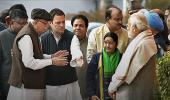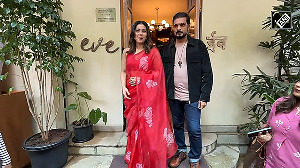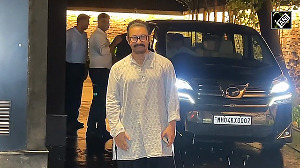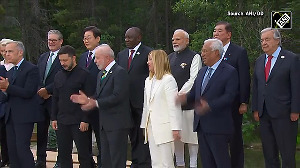'Like in cricket, M S Dhoni was the captain and Virat Kohli played under him.'
'Then Dhoni played under Kohli.'
'Now imagine, having a second switch.'
'That is the analogy here, and I find no other example in Indian politics, or even world politics.'
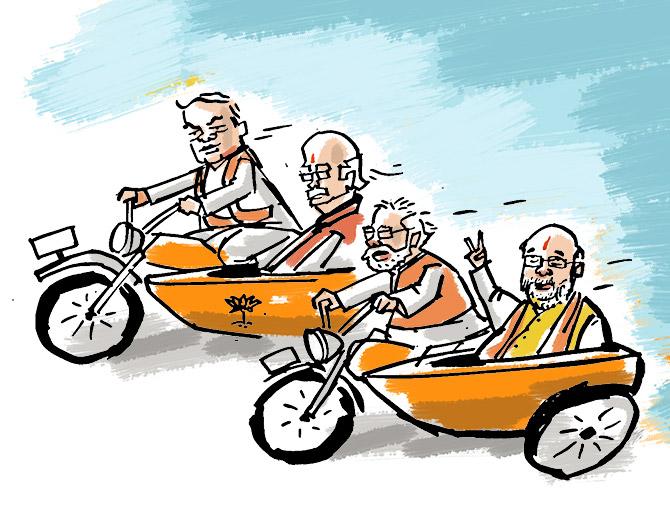
The Bihar assembly election, where the Bharatiya Janata Party upped its game to power the National Democratic Alliance to power in the face of the anti-incumbency battering Chief Minister Nitish Kumar, is proof that the dominant national party in the country has perfected the art of winning elections.
By any means.
Democratic, preferably, like in Bihar.
Or through other means, like in Madhya Pradesh, where the BJP engineered defections by Jyotiraditya Scindia and followers from the Congress to its fold, dethroned the elected Congress Chief Minister Kamal Nath, and brought back Shivraj Singh Chouhan who had lost the assembly election in 2018.
This determination to capture and retain power, through the consolidation of Hindu society, is what distinguishes the BJP from other political parties, points out Vinay Sitapati, using the terms "Hindu glue" and "Hindu Fevicol".
In his latest book Jugalbandi: The BJP before Modi, Sitapati, a former journalist who went on to do his PhD in politics from Princeton University and joined Ashoka University as an assistant professor of political science and legal studies, traces the seeds of Hindu nationalism sown in the early twentieth century till its ascension to power in 1998-2004, and posits that a key element of this rise was the "selfless jugalbandi" between Atal Bihari Vajpayee and Lal Kishenchand Advani.
Two diverse individuals from different backgrounds and geography with little in common still struck a chord between them and emerged as the dominant face of the polity from the late 1980s, their partnership making the BJP the dominant political force in a fast-fading Nehruvian India and laying the foundation for the emergence of Narendra Damodardas Modi and Amit Anilchandra Shah.
The reason he chose the Vajpayee-Advani partnership, says Sitapati, was because it was unlike anything seen so far in Indian politics.
'It is this partnership between Vajpayee and Advani that this book employs as a vehicle to study the Bharatiya Janata Party: From an ideology in the early twentieth century, to a movement, then party, and finally government from 1998 to 2004. This first phase ends with the arrival of Narendra Modi on the national stage,' he writes.
In a five-part interview to Rediff.com's Saisuresh Sivaswamy and Syed Firdaus Ashraf, Sitapati says, "There is an impression that Vajpayee was secular-liberal and Advani was a hardliner. But they were both playing their roles."
- Must read excerpt from Jugalbandi: Modi and Shah are ruthless to political opponents
There have been other jugalbandis in Indian politics.
Between Mahatma Gandhi and Jawaharlal Nehru, for one, that set the tone for the idea of India.
Between Sonia Gandhi and Manmohan Singh that set the tone for middle class prosperity.
What is special about the Vajpayee-Advani combo?
The word' jugalbandi,' in a classical music concert format, refers to when two different musicians play different instruments but equally.
In classical music, normally there is one player and the rest are accompaniers. While in a jugalbandi, there are two main players.
In my book, I have spent a lot of energy in showing that, ultimately, there was equal music between Vajpayee and Advani.
The other jugalbandis which you mentioned were the ones where hierarchies never changed.
Between Dr Singh and Sonia Gandhi, where is the debate as to who is the boss? Gandhi and Nehru once again (the same).
But here (in the case of Vajpayee and Advani), the hierarchy switched twice.
As I mentioned in the book, after the murder of Deendayal Upadhyay in 1968, Vajpayee makes his way to become head of the party overturning Balraj Madhok's desire to become number one. And from 1968 to 1986, he completely controls the party.
Be it the Bharatiya Jana Sangh or the Bharatiya Janata Party, from 1980 to 1986, he is heading it in his secular socialist image.
He wanted the BJP to be the intellectual legatee of Jayaprakash Narayan and this happened in 1980 in Mumbai, at its Bandra Reclamation meeting.
In 1986, the Rashtriya Swayamsevak Sangh demands of Vajpayee that he steps down as party president -- punishment not only because Vajpayee was distancing from the RSS but also because his 'moderate' ideology did not work electorally in the 1984 elections.
And from 1986 to 1994, it is Advani who is unambiguously in charge and Vajpayee serves under him.
In 1995, it is Advani who decides to put Vajpayee's name forward (for the prime minister's post) for the coming (1996) elections.
I have never seen a situation where there is a double switch in politics. Single switch, that itself is very rare.
Like in cricket, M S Dhoni was the captain and Virat Kohli played under him. Then Dhoni played under Kohli. Now imagine, having a second switch. That is the analogy here, and I find no other example in Indian politics, or even world politics.
The heart of the book is that they are different people, different personalities and frankly, they did not like each other from the 1998-2004 period as Advani felt slighted, but nonetheless, as they say, lots of problems but no divorce.
And that organisational glue, what I called the Hindu Fevicol, is what distinguishes the BJP from other parties.
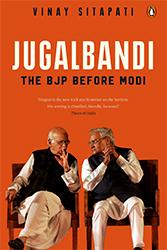 The BJP does not win because of Hindu majoritarianism because there are other ways to conceive a majority in India.
The BJP does not win because of Hindu majoritarianism because there are other ways to conceive a majority in India.
For example, Kanshi Ram conceived the Bahujan Samaj Party in 1984 as a party of the anti-upper castes of India, that is a majority which is 70-80 per cent of India's population.
He gives speeches to Christians and to Muslims and various OBC communities separately, but very quickly among all his lieutenants, who are from different lower caste Hindus and also Muslims, he chooses only one (Mayawati from the Jatav caste) and the BSP has now been reduced to a one-caste, one-state party.
And you see the recent elections in Bihar where the Communists were very strong historically. The Communist Party of India had won in Patna too. Dr (A K) Sen of the CPI represented Patna Central in the Bihar assembly.
But one of the fatal flaws of the Communist movement in Bihar was that they split into underground and overground.
It was an ideological clash and not a personality clash. Had the Communists not done that in the 1980s, which was a pivotal moment when the Congress was collapsing and a lot of vote banks were mobile, you would have got a very different picture (in Bihar).
And the reason the BJP wins lies in its ability to stick together and not necessarily (on the basis of) Hindu majoritarianism because that needs to be constructed and created. It is not a given. And it requires organisational unity.
That is why I saw this particular jugalbandi (of Vajpayee and Advani) as unique.
And this jugalbandi's uniqueness is one of the several reasons why the BJP wins and which is the least explored.
Do you see any similarity between how Advani and Vajpayee ousted Balraj Madhok and how Narendra Modi and Amit Shah ousted Advani?
The difference is in the reaction. There is no shortage of incidents of sidelining in the Jan Sangh-BJP history.
Balraj Madhok was sidelined, Nanaji Deshmukh was sidelined, Dr Subramanian Swamy was also sidelined. And all three of them reacted very differently.
Nanaji kept quiet and accepted his fate. He travelled all the way to Chitrakoot where he took vanvas.
In 1984 he openly supported Rajiv Gandhi's Congress over the secular Atal Bihari Vajpayee, but other than that he did not make a nuisance of himself. There was no question of him splitting the movement.
Balraj Madhok again did not split the movement, but he created a din.
Advani has not done that. And I think it is because Advani is more of an ideologue. He has been humiliated and Murli Manohar Joshi as well.
But he is not going to speak publicly. He will make some angled statement here and there.
It is driven into him that if you speak against the family, then you are mimicking the weaknesses of Indians of past.
That kind of self-understanding of Advani is the Hindu Fevicol which binds them, is a particular analysis of Hindu history. The veracity of that history you can question, but it has been converted into a powerful organisational belief in unity.
Advani did make a statement against Modi, that he is a good event manager.
He made that kind of statements, but he did not split the party.
Look at Sachin Pilot who took away Congress MLAs. The only analogy to that is what Shankarsinh Vaghela did in 1995 when he took several MLAs to Khajuraho, demanding that Narendra Modi -- seen as a loyal lieutenant of Keshubhai Patel -- must not set foot in Gujarat.
That's what resulted in Modi's exile to Delhi between 1995 and 2001, when the man who never held any post till then became the chief minister of Gujarat..
And this (Hindu Fevicol) is one of the factors why Advani stepped down and appointed Vajpayee as the prime ministerial candidate.
The BJP has never forgotten Vaghela's story. That's because it is so rare in the BJP.
But today, this thing is very common in the Congress party.
It must have been difficult for Advani to give power back to Vajpayee knowing fully well that he had built up the party.
That is selflessness and jugalbandi. If Advani had become PM candidate in 1995, the BJP would not have got coalition partners.
Indian politicians think of themselves as superstars, but Advani had a great quality in understanding his own limitations and was good at self-assessment.
It was his greatest hour. He could have become the prime minister and the government would have been unstable. So it was good for the BJP that Vajpayee was the face. It was a selfless sacrifice by Advani.
One of my takeaways from your book was that you are not very fond of Vajpayee, especially the way he outmanouevred threats to his position in the party/government.
There is an impression that Vajpayee was secular-liberal and Advani was a hardliner. But they were both playing their roles.
The RSS used to call Advani as 'Macaulayputra' (son of Macaulay, a derisive term used for those who, in view of the Hindu Right, don't respect Indian culture and heritage), the English-speaking type.
He was very wealthy. His family was (based) in Karachi (before Partition) and I interviewed someone who had been to his house in Karachi.
One could enter his home in a 'Victoria' (horse-pulled carriage).
He was playing tennis when his friend left the game half-way to attend the RSS shakha, and Advani goes along.
I suspect no one has done such a thing to join the RSS. This is also mentioned in Advani's memoir.
After Partition his father died penniless, that was catastrophic.
The Sindhis have a very syncretic form of religion when it comes to Islamic rituals or Sikh rituals.
I heard it from Karan Thapar who was told by one of Advani's friends that he does not have an anti-Muslim bone in that sense.
I think his rath yatra was naked political opportunism. It was a reaction to the Mandal Commission report which came in August 1990. His rath yatra, in September 1990, was aimed at uniting Hindus as it was feared that the Backward Castes won't vote for the BJP. Advani succeeded in his efforts.
Vajpayee opposed the rath yatra, but after the demolition of the Babri Masjid he played the role of a defence lawyer to the BJP.
He wanted Modi sacked after the 2002 riots, but ultimately, he not only budged on that, but also he gave the most anti-Muslim speech soon thereafter.

